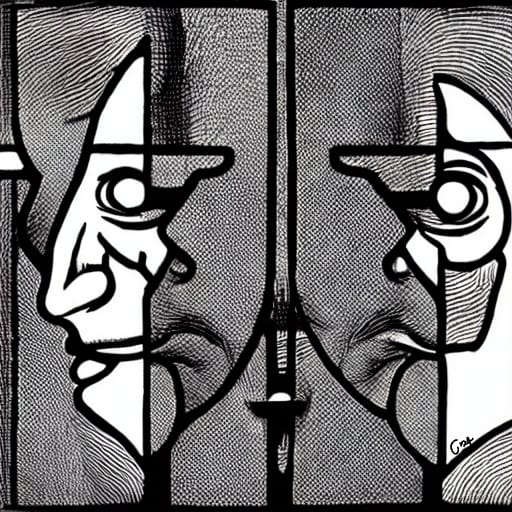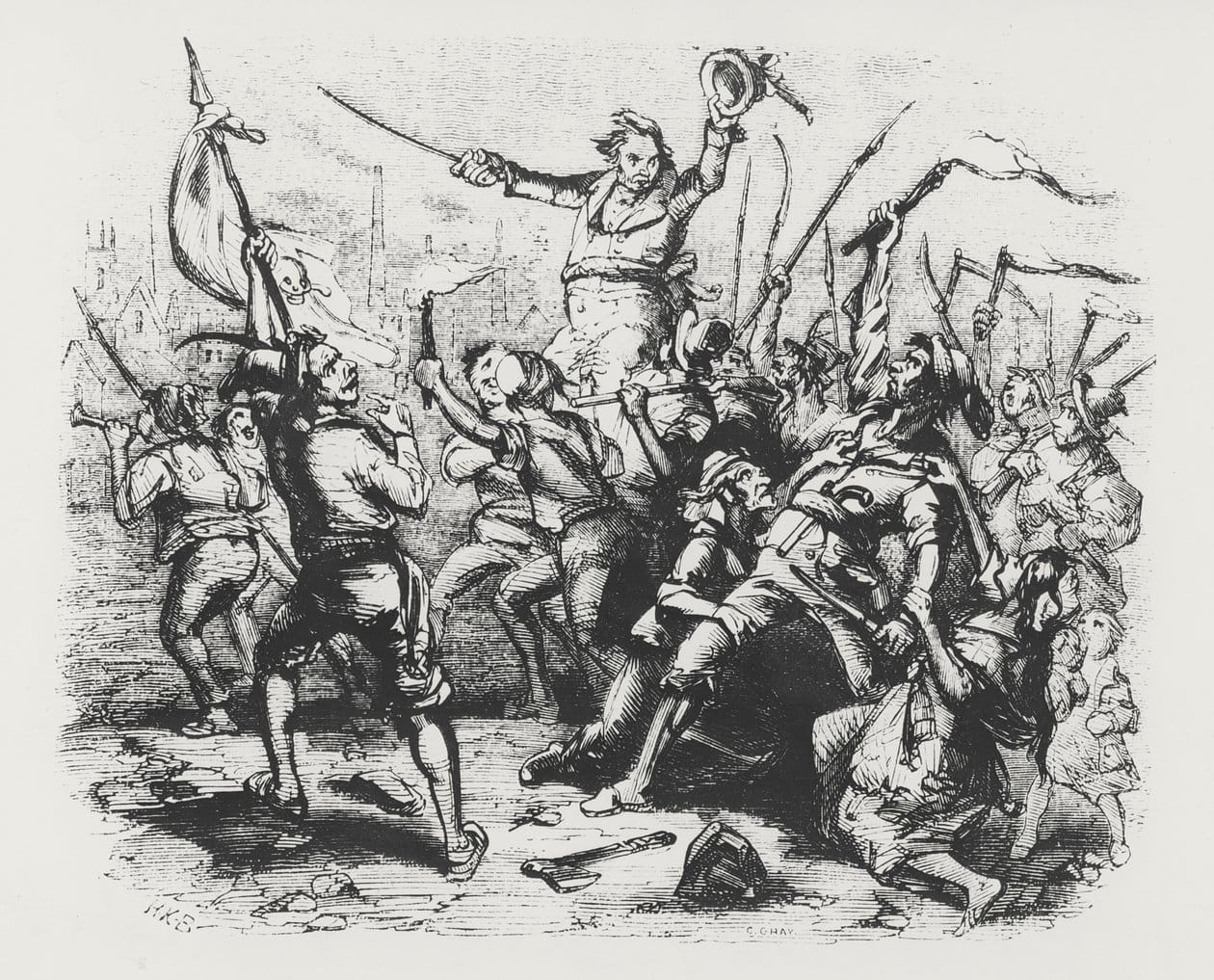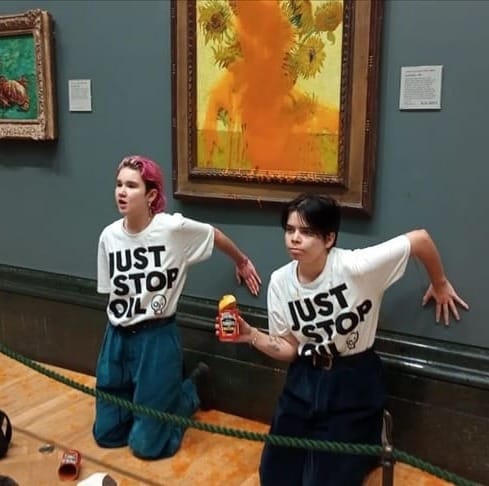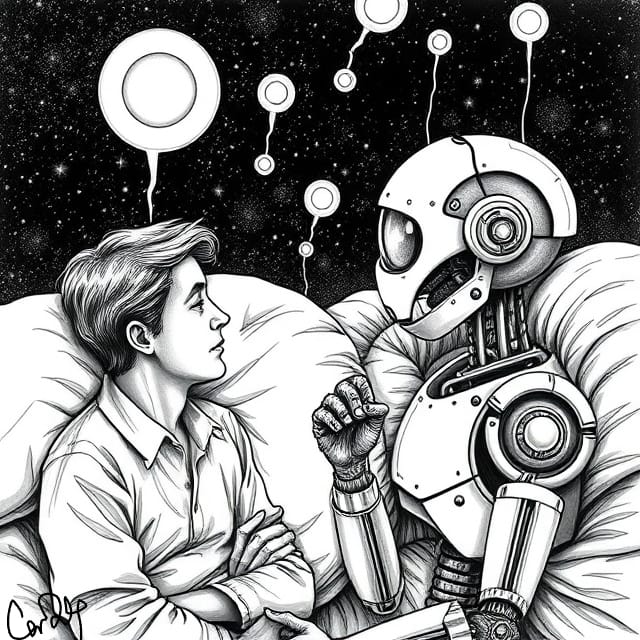The Art of Identity

Recommended listening: 'Sweet Dreams (are made of this)' - Eurythmics
How much of your identity is defined by the art you absorb? How does your music taste fit within your defined generation? Do the old masters figure in your life, or is an ironic guffaw at a banana gaffa taped to a wall as far as you go? Art funding is increasingly under attack in the UK as the post-Brexit 'benefits' continue to bite along with an increasingly unstable world, so what kind of future are creating where art is regarded as frivolous and unnecessary? Let's have an unreasonable debate...
SLEEPY SUFFOLK is far removed from where I sit, gazing out at a beautiful, but frozen, sunny Scottish morning, but it was the announcement of Suffolk County Council that grabbed my attention as an indicator of a wider UK-wide issue. They have announced a 100% cut to their core arts budget. Yes. 100%. All of it. For years, libraries have been under attack through a combination of changing technological consumption (or not) of the written word, but is this announcement more indicative of an over-arching ideological approach?
On the surface, the County Council have prepared the ground by using Covid recovery funding to cover the £500,000 budget cut for 2024/25, presumably in the assumption that it will give the institutions a year to find a way to replace the money. Suffolk is not alone, with a number of English councils declaring bankruptcy (the biggest being Birmingham City Council) and Nottingham declaring the same 100% arts funding cut approach the month before. It's a story old as time (sorry for the earworm) that in times of economic hardship, leaders look to ring-fence what pays taxes into the coffers and increases productivity and anything that has indirect benefits struggles - it's the nature of the capitalist system in which we exist; it becomes a fiery wrecking ball, swinging wildly, when coupled with free-market ideology. The dreaded 'Brexit' will be mentioned a few times in this article, but the effect on artists living, performing and studying in Europe should not be underestimated, along with the impact on whether European artists can be bothered with the red tape and expense of performing in the UK.
"Woah Carrumba! That's balderdash, you commie bastard!" Blithering Boris or Liz 'Tanky Tanky" Truss may be heard to admonish. "A free market generates individual wealth, encourages patronage, philanthropy, efficiency and accessibility! The arts are going to positively THRIVE! Sunlit uplands! Brexit Benefits! Blah blah fucking blah! Where's my fridge-house?" This is the fundamental problem that I suspect is trickling down to local authority level, combined with an ideological hatred of decentralised power. Recent Tory government has been noticeably vocal about attacking the devolved administrations of Scotland and Wales and any local Mayor who is not true blue are vilified as failing, and most despicably recently, attacked based on their religious beliefs. This desire for control stretches to local authorities, especially when people dare to vote for an administration led by a party differing to that of central government. This sunlit-upland ideology of control in a global market has proven to be true in so far as it exits on Atlantis... under the sea... and not real. It also marks the future trajectory of art creation going forward, enjoyed and created by the rich as a tax break or salve for the soul. As Tim Stoner recently observed, art courses seem to be filled with students whose first concern is "how do I get an exhibition?" rather than being artistic exploration with fellow weirdos, regardless of background.

Which highlights a related point in the article from Suffolk County Council, which is unsettling. The reason given for arts funding being withdrawn in its entirety is that "along with local authorities up and down the country, [it] has been hit hard by inflation and rising demand for services such as children’s care, special educational needs and disabilities and home to school transport." The inference here is that, if you protest against the defunding of art institutions, you are attacking the rights of the disabled and children. When arguments become couched in these terms it leads to bitterness which, again, has been an approach the UK Gov has not been afraid to take in its 'war on woke'. Fundamentally, however, there is little doubt that local authorities are struggling to meet the needs of their populace and tough choices need to be made. But have no doubt who has driven your local authority into that position.
All doom and gloom so far, so let's talk about the positives! What are the benefits of art? In the introduction to this piece, I mentioned music - as I sat to write this, the coffee shop was playing 'Zephyr Song' by Red Hot Chilli Peppers, which took me right back to changing the nappies of my son in the morning - the song was on a heavy rotation in 2002. There are so many life moments that are brought to mind by music - Louis Armstrong's 'Wonderful World' as the first dance at Mrs. Carrumba and I's wedding. 'O Mia Babbino Caro' by Maria Callas, 'Paradise City' by Guns 'n' Roses and 'The Final Countdown' by Europe all remind me of a hospital stay, projectile vomit (with hilarious consequences) and my last year at primary school. Yep, music definitely has an outsized effect on memory and mood for me - I can't imagine a world without it and the idea of people of all ages not being able to access affordable tuition or performances is depressing.
The current cultural times favour the vapid 'influencer' but it doesn't mean that all those who embrace Twitch, YouTube and TikTok to 'perform' are grifters on the take. If anything, they are the very embodiment of free market thinking with talented streamers often making up the 72.6% that don't make any money while Twitch owners Amazon generated $2.8 billion. Git guid n00b! Meanwhile, 'traditional' art finds itself under attack from Ai generated offerings (like my piece at the top of this article!), commodification in the form of crazy schemes like NFTs (it's noticeable that most links brought forward by a search for 'effect of NFTs on the art market' brings forward pieces by the likes of The Economist and Morgan Stanley) and rich art collectors who would rather destroy artwork they own when they die rather than pass it on (important context - this was discussed on a Talk Art podcast regarding a Japanese collector though they did not mention that it is traditional in Japan to cremate personal belongings with their owner).

Art provokes deep feelings of connection between observers and pieces (especially if it improves their bank balance.. so cynical, aren't I?) and is often covertly or overtly political. A Russian artist, Andrei Molodkin, has recently claimed to have gathered valuable artworks, including a painting by Picasso, and sealed them in a safe with acid and a dead-man's switch on a timer to destroy them if Julian Assange dies in prison. Again, the UK Government has flirted with controlling political messaging in art through the recent guidance published by Arts Council England that warned overtly political or activist messaging in works could lead to withdrawing of funding. Furious reactions ensued, but the creeping constriction of freedom of expression continues, and how committed Keir 'stand for nothing in particular' Starmer would be to reversing course is hard to tell.
Urgh, getting negative again! Not all art is political, and personally I am a great fan of Cézanne and how he turned artwork on its head - dispensing with the classical fascination with realistic portrayals of the wealthy and bowls of fruit in favour of impressionistic renderings and scratching away at the canvas. Art that pushes boundaries and challenges the establishment appeals to my sense of mischief, and it's fun to see what emerges as the basis of the new establishment. While it's fun to laugh at bananas taped to a wall, and undoubtedly some art is the product of an artist disappearing adroitly and efficiently up their own arses, it's all part of the discourse, fun and very human connection that art fosters and nourishes. In an age when critical thinking and freedom of expression is under threat, art is a tool we all need to cling to, in whatever form it takes.
So, if you haven't visited your local museum or art gallery recently, take an afternoon to expand your mind and see what is there. Take your time, take a friend or family member or just have a lone wander. Consider what a world without access to spaces like this would be, and what the impact on imagination and ingenuity could lead to. Personally, I don't want to live in a world based solely on spreadsheets and algorithms.
